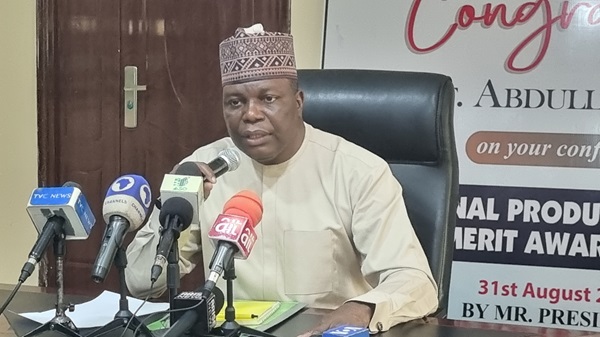
In a significant move towards fostering biotechnological research and development, the National Biotechnology Development Agency (NABDA) has launched the NABDA Journal of Biotechnology Research (NJBR).
This launch, according to the agency’s director-general, Prof. Abdullahi Mustapha signifies a commitment to advancing scientific research in biotechnology and providing a platform for the dissemination of crucial research findings.
Addressing journalists during the year-end gathering in Abuja, Mustapha highlighted the pivotal role the NJBR would play in amplifying groundbreaking work in biotechnology, inspiring future discoveries and contributing to global scientific discourse. The journal will cover various areas, including agricultural biotechnology, bio-risk management, bioethics and biosafety, bioinformatics, genomics and proteomics, environmental biotechnology and bio-conservation, food and industrial biotechnology and medical biotechnology.
“The National Journal of Biotechnology Research will be an invaluable resource for researchers and stakeholders across the globe in this space,” stated Mustapha, emphasising the importance of showcasing Nigerian biotechnology research on an international platform.
In addition to the journal launch, Mustapha announced NABDA’s intention to collaborate with the African Agricultural Technology Foundation (AATF) on research and development activities. The focus of this collaboration includes reducing post-harvest crop losses and enhancing nutrition security among Nigerians. Areas of collaboration encompass training and capacity enhancement of researchers, joint research projects on vegetables, pearl millet and more. Furthermore, the agency is exploring collaboration opportunities with South Africa in the field of biotechnology.
“Only recently, I led a delegation to the South African High Commissioner and had fruitful discussions for the advancement of biotechnology in Nigeria,” Mustapha revealed, indicating the agency’s proactive approach to international partnerships.
He expressed gratitude for the support of former president, His Excellency, Dr. Goodluck Ebele Jonathan GCFR, who has taken on the role of AATF Goodwill Ambassador, emphasising the need for continued advocacy to bridge existing gaps in understanding the importance of investing in biotechnology.
Commending Nigerian journalists for their role in fostering dialogue and promoting innovation in agriculture, Mustapha urged the press to intensify efforts to encourage the adoption of biotechnology in the country. He emphasised the importance of evidence-based discussions involving various stakeholders, including farmers, policymakers, scientists and the public.
“If we must change the narrative about Nigeria’s food security, the science of biotechnology must be communicated effectively. We must not allow biotechnology to become the subject of cheap political and public discourse,” pleaded Mustapha.
Highlighting NABDA’s commitment to ensuring food security, he acknowledged the agency’s crucial role on the international stage and announced plans for collaboration with the National Board for Technology Incubation (NBTI) to commercialise research and development findings, fostering indigenous talents in biotechnology.
In conclusion, Mustapha stated, “Nigeria’s efforts at making biotechnology the fulcrum for national development have garnered international recognition and solidified Nigeria’s position as a key player in the global biotechnology landscape”. He also hinted at future initiatives, including mentorship programmes to raise the next generation of scientists with a focus on biotechnology.


